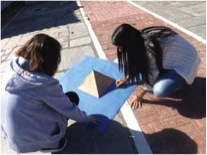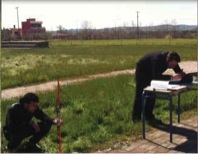
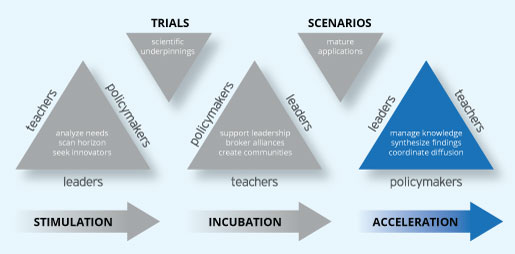
The accelerating phase is the period where the educational change is expanded to significant portions of the student population, activities are taken up in representative schools, and knowledge management is used among partners
Key conceptsAccelerating Dissemination Diffusion |
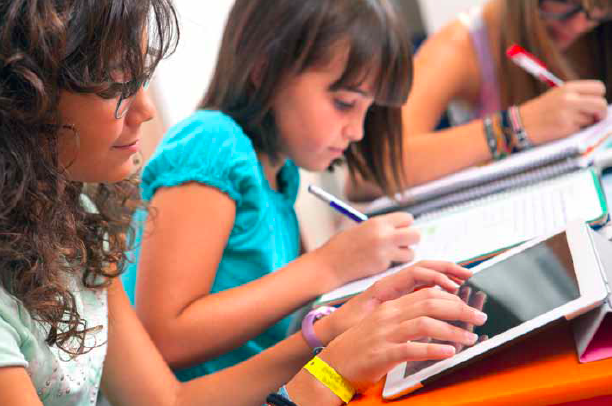 |
How does acceleration work?
Accelerating through government reform, local initiatives, or both
Forces at play
Throughout this phase, attention is given to:
- exploiting knowledge management techniques (sharing what is known within ODS partners and participants);
- synthesizing evaluation and research (to inform efforts);
- accelerating diffusion with national agencies (to reach increased numbers of users on the ground).
There are two kinds of processes in this phase: dissemination and diffusion. School principals and headmasters play vital role in both of them (both directly and indirectly). Dissemination is a one-way process where information is offered or broadcast. In ODS, information about the innovation is shared, e.g. through presentations, workshops, webinars, training academies, meetings, websites or other media. Complementary to this, diffusion is the process through which interventions are pulled into practice from within. For example, practitioners exchange information, arrange demonstrations, or coach each other. It is not necessarily the scope of diffusion that measures an intervention’s success, but its presence is one important indicator. It is a “spread within” which can be seen, for example, when reform principles or norms of social interaction become embedded in school policies and routines, or when teachers draw on those ideas and put them to use in other aspects of their practice, which were not explicitly addressed by the intervention.
Diffusion tends to be less common than dissemination; and innovators can sometimes be both delighted and overwhelmed when it starts to take place. In order to be successful, diffusion should be encouraged by the school management. Educational leaders can be very supportive in these processes. First of all, they can initiate dissemination activities. In order to motivate the teachers, ODS headmasters are offered a gamut of ODS presentations, workshops, webinars, training academies, meetings, etc. to choose from. They can decide on the actual school poliicy and in accordance with it use what ODS offeres. No other portal has been created with such meticulous attention only for education needs and teachers as its target audience. In the following passages there are some tips and practical ideas how headmasters can benefit from ODS in order to motivate teachers.
| Headmasters, teachers, ODS – what’s the connection? | ||
The most important task for headmasters is to motivate teachers (and learners) to use eLearning resources. That means:
|
 |
|
 |
In order to overcome organizational and technical barriers, the following should be done:
|
|
Acceleration stories from ODS activities in Greece
Overview
ODS cases from Greece ODS has up-to-date (January 2015) achieved to engage 433 schools in Greece, whose participation is being coordinated and supported by Ellinogermaniki Agogi Research and Development Department. Other Greek partners are the University of Piraeus, the Technical University of Crete, the Greek Research and Technology Network, Agro-know Technologies, as well as CTI Diophantus and the Institute of Educational Policy, which are supervised by the Greek Ministry of Education. Out of these schools, 312 were recruited from January 2013 to December 2014 through various channels (ODS visionary and practice reflection workshops, conferences, presentations and other dissemination events, previous projects), while 122 schools were added in January 2015 after a general call that the Institute of Educational Policy addressed to all schools of the country. This formal call was in fact a significant step in the official adoption of Open Discovery Space by the National Educational Policy and the acknowledgement of its potential impact on the modernization of school practice and the promotion of innovation in Greek schools.
A variety of activities is suggested to schools by the Ellinogermaniki Agogi team and a series of respective ODS communities has been set-up to support their implementation. In terms of curriculum areas, these activities involve Science and High Energy Physics, Environmental Education, Music, Entrepreneurship, as well as teacher training on educational design and a focus on pupils’ transversal key competences. The schools are free to choose more than one of the supported activities and, although Ellinogermaniki Agogi provides them with tools and educational scenarios, they are also encouraged to adapt these resources to their own needs and specific contexts, using the ODS template for the school‘s action plan.
Below is a short description of three selected cases and implementation activities from Greek schools that share the following characteristics:
- Connection, community building and sharing of resources among remote schools through the ODS portal.
- Increase of access to resources for remote and –subsequently- underprivileged schools through the ODS portal and tools.
- Teachers’ increased familiarisation with digital educational design tools and implementation of innovative teaching methods, such as the inquiry-based model and project-based practices.
- Schools’ collaboration through ODS with regional policy makers, universities, professional artists and other organisations and thus networking and opening-up of the school.
| Connecting schools through music | ||
| Context "Akriton Mousiki" was a live interactive performance audiovisual event combining Music and Digital Shadow Theatre. The performance was inspired by the Greek Acritan heritage and included the collaborative preparation, co-creation and realization of an online event between multiple distant ODS schools linked together via videoconference. During the "Linkcast" (webcasted videoconference) pupils from four remote schools presented a virtual-stage role-playing educational activity by moving digital figures (e-shadow platform) accompanied with shared live Music performance. The scenario included an advanced interaction between these five remote educational communities on the islands of Karpathos, Gavdos, Kastelorizo and Cyprus hosted by Athens. Part of the dialogues arranged for the event was based upon the Byzantine epos of Digenis Akritas digitized by the University of Crete Anemi Database. The development of the "Akriton Mousiki" activity is the first attempt to produce advanced-interaction scenarios between 4 remote islands in Greece including Cyprus via live videoconference involving Music as a performance art. |
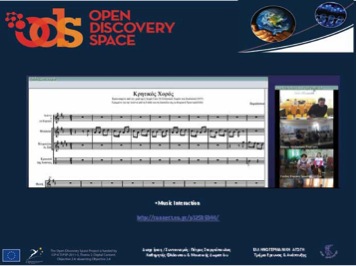 |
|
Tools
Digital tools and resources, online communities, sharing experiences and results.
Scaffolds
Online mentoring, collaborative working with use of online resources.
Process
A new community was formed inspired by the "Akriton Mousiki" activity. “Travelling in the era of Erotokritos” is a community of teachers in Chania-Crete exploring educational aspects of Vincenzo Kornaro’s epos of “Erotokritos” and other personalities of the post-Byzantine era such as the famous painter Domenikos Theotokopoulos and the composer Frangiskos Leontaritis. The community through its manager in Chania, took part in a group of the “Let Us Share The Music/Let Us Link The World” community along with community-members from Athens and Evros (Northern East of Greece) The group contributed in the preparation of an ODS scenario based on the above prominent Renaissance figures and their Art. After online training, provided by the parent community manager, the teacher in Chania recorded and edited digital audio files of her pupils narrating extracts of the poem she had prepared. Digital contributions were uploaded as extracts next to music excerpts from the same era, performed by professional musicians who granted the group with their permission to use their content for educational purposes. Original Digital Audio Workstation music was also arranged, composed and produced by the parent-community-manager to accompany the pupils’ narration. Pupils’ paintings were uploaded as well.
Impact
The outputs of these activities leaded and with an aim to create a Virtual school on the theme of Music the ODS Teachers Training Academy “Live-Music Education” has been developed in order to lead future members into advanced methods of exploring ICT in musical interactive scenarios http://portal.opendiscoveryspace.eu/topic-courses/live-music-education-academ.
| Increased interest and greater interaction in Remote Tychero | ||
| Context The High School and Senior High School of Tychero are located in a rural agricultural town of North-eastern Greece, near river Evros. The area, as all rural areas in Greece that are situated on the borders of the country, is defined as a remote one, with accessibility problems that the educational authorities officially recognize and attempt to address. The two schools are relatively small in terms of student population and face practical difficulties, such as inadequate number of teachers, frequently moving staff, poor infrastructure and accessibility issues due to their location. However, in the last few years the schools of Tychero have been having an increased interest participating in European networks, in collaborating with peers and other schools and in searching for opportunities to improve their quality of teaching and developing the students’ 21st century key- competences. |
|
|
Tools
Digital tools and resources, online communities, sharing experiences and results.
Scaffolds
Face to face and online training material made available.
Process
Both schools entered ODS at the beginning of Pilot Phase 2 (September 2014) after being introduced to it in a Practice Reflection workshop organized by the regional school counsellor who collaborates with the Ellinogermaniki Agogi team. Regional school counsellors are appointed by the Ministry of Education and the experience of ODS in Greece has shown that their role can be significant in disseminating innovative projects, such as ODS, as well as in recruiting and motivating schools to participate. In addition, since they are working at local level they can act as mediators in identifying and supporting individual teachers that are already active and motivated. Mrs Stella Tryfonidou, Science and Technology teacher, is an example of this type of teachers, who, acting as a change agent, recruited in turn both of the schools of Tychero in ODS in order- as she identifies – to: a) enhance the access of her school to qualitative and innovative educational content from ODS, and especially the repositories of OSR and Discover the Cosmos, b) take opportunities for various educational activities, c) participate in teachers’ professional development training. Within this framework, Mrs Tryfonidou designed four innovative educational scenarios that are based on the inquiry model and made use of resources from these repositories, as well as of the ODS authoring tool. The scenarios have been implemented in the schools of Tychero or are currently still in progress (January 2015) with the support of the Ellinogermaniki Agogi R&D Department.
The first scenario was implemented within the ICT Curriculum with First-graders (15 years old students) of the Senior High school of Tychero and was entitled “Pacman with Scratch”. The idea of the scenario is the development of an application in an optical programming environment, such as Scratch. The students worked in groups, designed the application and implemented it through Scratch. They then tested and evaluated it and disseminated it to peers and the local community. The results of the work of Tychero were presented at the Panhellenic Student Festival of Digital Creativity, which is organized every year by the regional ICT school counsellors. The scenario has been uploaded onto the Greek community of educational Scratch programming of the ODS portal http://portal.opendiscoveryspace.eu/community/senaria-didaskalias-se-perivallonta-optikoy-programmatismoy-me-plakidia-668762
The second scenario was entitled “How did Thales calculate the height of Pyramid of Cheops?” and was implemented at Tychero in the school year 2014-15. The scenario was based on the Project Based Learning approach and engaged the students (15-year-olds) to construct a simulacrum of the Pyramid and calculate its height, following the same method that Thales used in the 6th century B.C. Mrs Tryfonidou based her work on an original scenario that was already available on the OSR portal http://www.osrportal.eu/el/node/95028 that she then adapted.
The implementation of the third educational scenario was inspired and initiated by the Eratosthenes experiment http://eratosthenes.ea.gr/, an international activity, which was offered to ODS and ISE (Inspiring Science Education) schools in March 2014 attracting 350 schools from 37 countries. Here again, the activity implemented at Tychero with second-graders (16-year-old students) was based on an original scenario of the OSR portal http://www.osrportal.eu/el/node/94691 that Mrs Tryfonidou adapted to her school and students’ needs.
Finally, the fourth scenario, that is currently being implemented in the High School of Tychero, is entitled “Good night to the stars” and its objective is to introduce the students (12 -15 year-olds) to basic concepts of Astronomy and prepare them for a virtual connection with the Faulkes robotic telescopes, that will be conducted with the support of the Ellinogermaniki Agogi R&D team. The scenario will also engage the students in constructing a model of the solar system and disseminating their final report onto a wiki environment.
Impact
The evaluation of the impact of these scenarios on pupils’ learning is still in progress, however some significant remarks made by the teacher include: increased interest on the part of students, greater satisfaction from hands-on learning compared to conventional teaching and thus accomplishment of affective educational objectives. There was also improvement in classroom time management and psychomotor objectives, such as the pupils working effectively in groups, taking initiatives and volunteering to work on these projects in their free time. The teacher herself also reported that the resources of ODS supported her in terms of Scientific expertise and motivated her to be more creative and inspired.
Lessons learned
In summary, the overall experience from the implementation of ODS in Greece has shown that the following practices can have a positive impact on schools’ engagement to a project that promotes school innovation and on making the most of the opportunities it provides them:
- The ODS approach based on its innovation model, that considers the schools and the teachers as capable of innovating, can be unprecedented or even challenging for schools, especially in countries with centrally governed educational systems, like Greece. Providing individualized and personal support to is crucial in helping schools develop their own innovation strategy and convince them that they have the power to change and improve education.
- To the same end, engaging and collaborating with regional educational authorities and policy makers also helps in creating a safer environment for schools and teachers that seek change and innovation. - Opportunities for disseminating individual cases of innovating teachers and schools to their local or wider educational community (e.g. teachers presenting their own work in conferences or presentations through the press/ media) can have a very positive impact on schools’ engagement: In this way individual efforts are rewarded and further encouraged, acting also as multipliers and sources of inspiration for other teachers and schools.
- Similarly, it is important to promote regular networking activities that bring together teachers from different school settings in order to build trust and a common vision that will encourage them to share their resources on a public platform, such as ODS.
Tips for accelerating
In order to motivate and inspire teachers, headmasters need to set up a personal example of lifelong learning and professional development. Their influence starts from their internal engagement on personal and professional development in order to provide good example and set up the atmosphere. Further steps include external influence which they make on teachers by creating the climate for “pull” approach (with the main aim to show “follow me” instead of “go ahead”). Finally, one of their external influences to motivate teachers is to nurturing life-long learning and professional development of teachers by providing (funding for) seminars, workshops, trainings, sometimes even their consent and approval for teachers to take a day off for development sessions.
As an example of a success story, there is a story about the headmaster from Technical School in Knjazevac, Serbia. Her name is Ljiljana Zikic and she was the first to introduce ICT into her school. She went to seminars and trainings, created lesson plans for teachers’ competitions, etc. In the end, she became a good example to the teachers from her school. The result is that in 2013 at the competition “Creative School” (organized by Microsoft Serbia and Institute for Improving Education) there were eleven teams, three teachers in each of them, from her school! She personally took part in three of them.
To accelerate the process, headmasters play an important role. They disseminate the information but they also make the diffusion phase more likely to happen when they create the positive atmosphere among teachers. It needs time, but it always ended successfully when headmasters were involved in the process.
Important factors Synthesize findings Coordinate dissemination & diffusion
|
|


